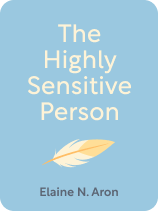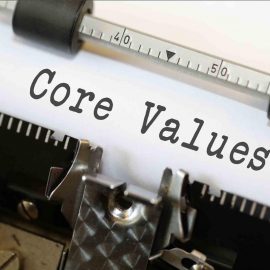

This article is an excerpt from the Shortform book guide to "The Highly Sensitive Person" by Elaine Aron. Shortform has the world's best summaries and analyses of books you should be reading.
Like this article? Sign up for a free trial here.
How does one navigate the world as a highly sensitive person? What are some tips a highly sensitive person can take on board?
The world wasn’t built with HSPs in mind. Our modern environment is highly stimulating, and HSPs often struggle to meet society’s expectations for socializing, working, and recreation, all of which can lead to overstimulation.
Elaine Aron, a psychologist, and an HSP herself, provides advice on how to meet these expectations while still protecting your sensitive self.
Treat Your Body Like an Infant
One of the best tips a highly sensitive person can take on board is to take great care of the body. Aron emphasizes that you should treat your body like you would treat an infant. Like an infant, your body can’t communicate with you through words, only through distress signals. Respond to your needs like you would respond to an infant’s cry. If your body’s telling you you’re overstimulated, remove yourself from the situation that’s causing you distress.
(Shortform note: While an HSP’s body may require more care and attention, its ability to sense subtleties can help HSPs identify distress signals from the body that might go unnoticed in non-HSPs, and therefore may allow HSPs to become aware of growing health problems sooner.)
Also like an infant, your body needs some degree of stimulation—though how much stimulation you need varies greatly from person to person, says Aron. It’s vital that you strike a balance between the extremes of the overprotective “parent” who never lets you explore and experience things and the negligent parent who ignores or doesn’t notice your distress signals and fails to protect you from overstimulation.
(Shortform note: Striking the balance between overstimulation and understimulation can be particularly difficult for HSPs who also have ADHD—a common combination. ADHD decreases a person’s threshold for boredom, causing them to need more stimulation, but high sensitivity causes stimulation to affect them more, lowering their threshold for overstimulation. This results in a narrower range of ideal stimulation, meaning that HSPs with ADHD may need to take extra care to ensure they are meeting but not exceeding their stimulation needs on a regular basis.)
Also, remember that you’re always growing and changing. Something that may be overstimulating right now will become easier the more you try it—an adaptation known as habituation. The more you do something, the less likely it will become overarousing and the more likely you will grow, learn, and benefit from it.
(Shortform note: Habituation can make stimulation less intense the more we’re exposed to it, but habituating to one thing may sensitize us to another. When the COVID-19 pandemic led to a decrease in in-person socializing, some people became habituated to isolation and consequently more sensitized to social anxiety, which made it more difficult for them to socialize as they did before. Particularly if you’re an HSP, you may need to take slow steps to re-habituate yourself with in-person interactions so you don’t become overstimulated when socializing.)
Tend to Your Unique Needs
According to Aron, HSPs need more rest and relaxation than non-HSPs. They also become tired more easily because of the energy it takes to be so attuned to and to react to the world around them. Make sure you’re getting enough sleep each night and find time to rest in ways other than sleeping. Aron recommends that, even if you can’t sleep a full nine hours each night, you at least stay in bed for that full length of time so you can take a break from stimulation.
(Shortform note: While HSPs need more sleep than non-HSPs, they may also find it more difficult to sleep because of their high sensitivity. To ensure you get enough sleep each night, make sure you are reducing your stimulation in the evenings so you won’t go to bed feeling wired, and try to establish a nightly routine to keep your sleep on track.)
In addition to rest, make sure you have time set aside for relaxing and fun activities (whatever those look like for you). HSPs tend to have trouble relaxing unless all of their “work” or more difficult obligations are done for the day, so try to find a way to relax even if you haven’t completed all your obligations.
(Shortform note: Remember that you don’t have to “earn” rest and relaxation. Even if you feel like you haven’t done as much work as you’d like, make sure you’re allowing yourself to rest as much as you need and to engage in activities that replenish your energy. Also, consider what types of rest work best for you in different situations. If you’re physically worn out then you probably need some sleep, but if you’re feeling emotionally drained, for example, the best way to rest might be to express your emotions to a good listener.)
Avoid Harmful Labels
Finally, Aron writes that you should avoid taking on harmful stereotypes and labels like “shy.” Many HSPs are labeled “shy” because they tend to avoid high-stimulation situations, which can include many social situations. However, “shy” and similar labels have a negative connotation that can be damaging to your self-esteem, and they’re also not accurate for all HSPs. Aron says they can also be self-fulfilling, so if you think of yourself as a “shy” person, you’re more likely to develop traits like social avoidance.
(Shortform note: Feelings of shyness and social avoidance are sometimes the result of fear that has built up as a response to rejection, a trait known as rejection sensitivity. An HSP’s high sensitivity often includes sensitivity to rejection, making them more likely to have strong reactions to negative social interactions and, consequently, to avoid social interactions more.)
It’s also a myth that highly sensitive people are more likely to be depressed or anxious or have other mental health conditions. HSPs with troubled childhoods are at higher risk for depression and anxiety, but those with positive childhoods are no more at risk than non-HSPs. People also often confuse high sensitivity with anxiety or neuroticism. HSPs might also have these symptoms, but they’re not part of the HSP trait.
(Shortform note: While being an HSP doesn’t automatically mean you’re more likely to develop a mental illness, having a mental illness can sometimes cause increased sensitivity. A non-HSP who is depressed, for example, may find themselves experiencing sensory overload more frequently or needing more alone time than they do when they’re not depressed.)

———End of Preview———
Like what you just read? Read the rest of the world's best book summary and analysis of Elaine Aron's "The Highly Sensitive Person" at Shortform.
Here's what you'll find in our full The Highly Sensitive Person summary:
- The strengths and challenges associated with being a highly sensitive person
- How to manage your sensitivity in your personal, social, and professional life
- Why you should stop labeling yourself as "shy"






